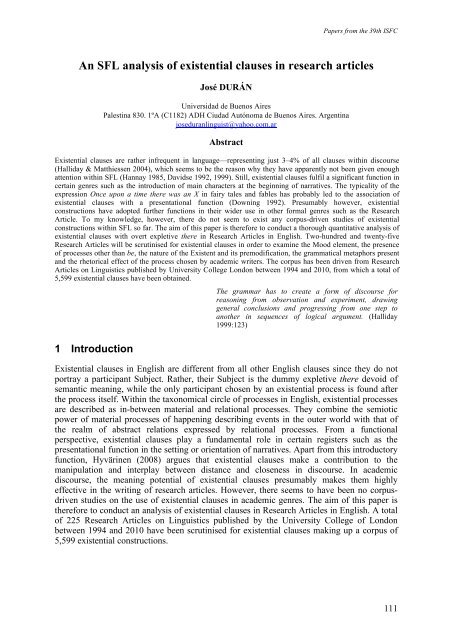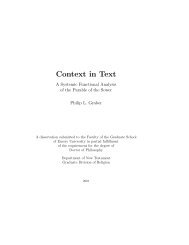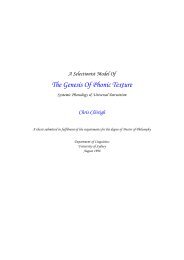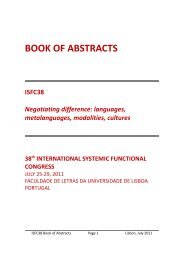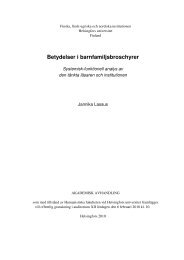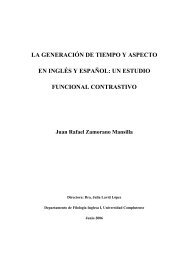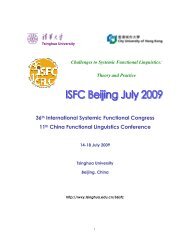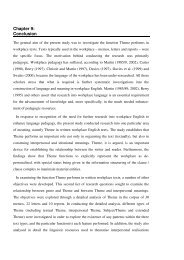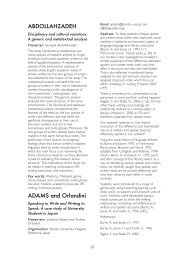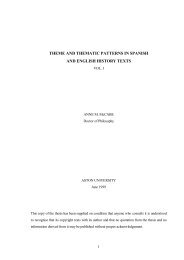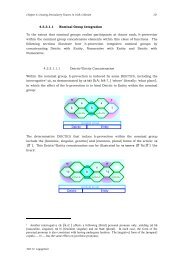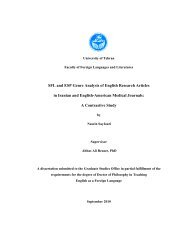the ISFC39 Proceedings - International Systemic-Functional ...
the ISFC39 Proceedings - International Systemic-Functional ...
the ISFC39 Proceedings - International Systemic-Functional ...
You also want an ePaper? Increase the reach of your titles
YUMPU automatically turns print PDFs into web optimized ePapers that Google loves.
Papers from <strong>the</strong> 39th ISFCAn SFL analysis of existential clauses in research articlesJosé DURÁNUniversidad de Buenos AiresPalestina 830. 1ºA (C1182) ADH Ciudad Autónoma de Buenos Aires. Argentinajoseduranlinguist@yahoo.com.arAbstractExistential clauses are ra<strong>the</strong>r infrequent in language—representing just 3–4% of all clauses within discourse(Halliday & Matthiessen 2004), which seems to be <strong>the</strong> reason why <strong>the</strong>y have apparently not been given enoughattention within SFL (Hannay 1985, Davidse 1992, 1999). Still, existential clauses fulfil a significant function incertain genres such as <strong>the</strong> introduction of main characters at <strong>the</strong> beginning of narratives. The typicality of <strong>the</strong>expression Once upon a time <strong>the</strong>re was an X in fairy tales and fables has probably led to <strong>the</strong> association ofexistential clauses with a presentational function (Downing 1992). Presumably however, existentialconstructions have adopted fur<strong>the</strong>r functions in <strong>the</strong>ir wider use in o<strong>the</strong>r formal genres such as <strong>the</strong> ResearchArticle. To my knowledge, however, <strong>the</strong>re do not seem to exist any corpus-driven studies of existentialconstructions within SFL so far. The aim of this paper is <strong>the</strong>refore to conduct a thorough quantitative analysis ofexistential clauses with overt expletive <strong>the</strong>re in Research Articles in English. Two-hundred and twenty-fiveResearch Articles will be scrutinised for existential clauses in order to examine <strong>the</strong> Mood element, <strong>the</strong> presenceof processes o<strong>the</strong>r than be, <strong>the</strong> nature of <strong>the</strong> Existent and its premodification, <strong>the</strong> grammatical metaphors presentand <strong>the</strong> rhetorical effect of <strong>the</strong> process chosen by academic writers. The corpus has been driven from ResearchArticles on Linguistics published by University College London between 1994 and 2010, from which a total of5,599 existential clauses have been obtained.1 IntroductionThe grammar has to create a form of discourse forreasoning from observation and experiment, drawinggeneral conclusions and progressing from one step toano<strong>the</strong>r in sequences of logical argument. (Halliday1999:123)Existential clauses in English are different from all o<strong>the</strong>r English clauses since <strong>the</strong>y do notportray a participant Subject. Ra<strong>the</strong>r, <strong>the</strong>ir Subject is <strong>the</strong> dummy expletive <strong>the</strong>re devoid ofsemantic meaning, while <strong>the</strong> only participant chosen by an existential process is found after<strong>the</strong> process itself. Within <strong>the</strong> taxonomical circle of processes in English, existential processesare described as in-between material and relational processes. They combine <strong>the</strong> semioticpower of material processes of happening describing events in <strong>the</strong> outer world with that of<strong>the</strong> realm of abstract relations expressed by relational processes. From a functionalperspective, existential clauses play a fundamental role in certain registers such as <strong>the</strong>presentational function in <strong>the</strong> setting or orientation of narratives. Apart from this introductoryfunction, Hyvärinen (2008) argues that existential clauses make a contribution to <strong>the</strong>manipulation and interplay between distance and closeness in discourse. In academicdiscourse, <strong>the</strong> meaning potential of existential clauses presumably makes <strong>the</strong>m highlyeffective in <strong>the</strong> writing of research articles. However, <strong>the</strong>re seems to have been no corpusdrivenstudies on <strong>the</strong> use of existential clauses in academic genres. The aim of this paper is<strong>the</strong>refore to conduct an analysis of existential clauses in Research Articles in English. A totalof 225 Research Articles on Linguistics published by <strong>the</strong> University College of Londonbetween 1994 and 2010 have been scrutinised for existential clauses making up a corpus of5,599 existential constructions.111


